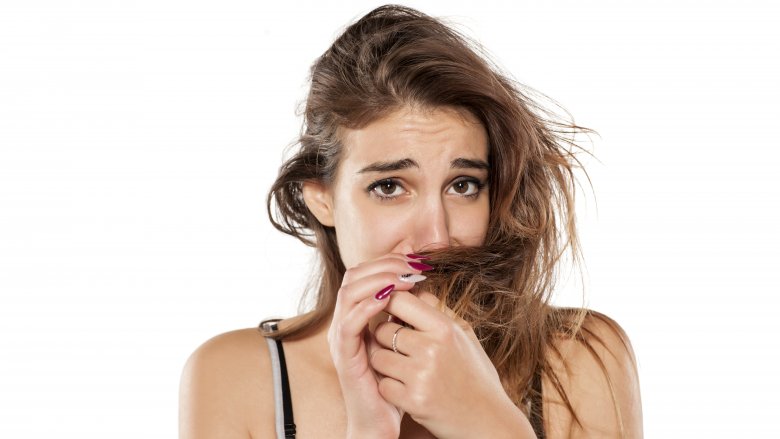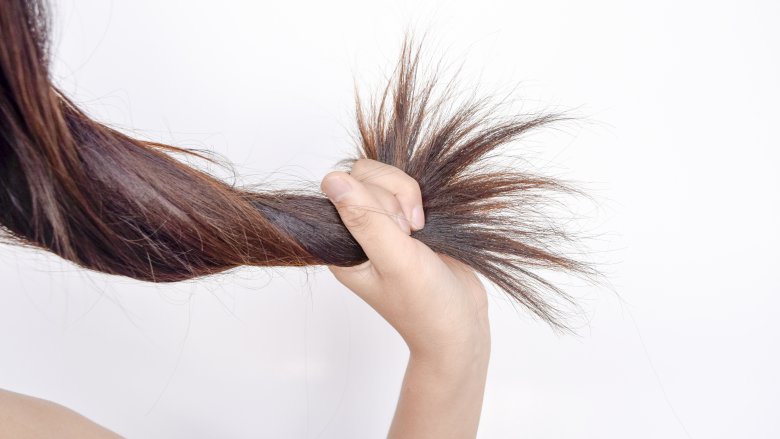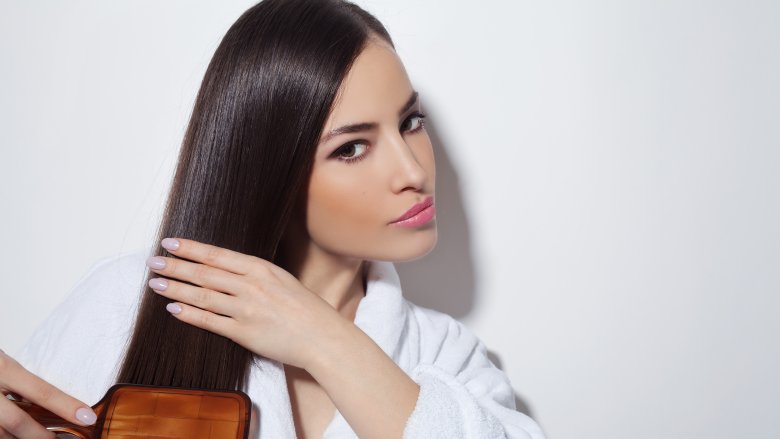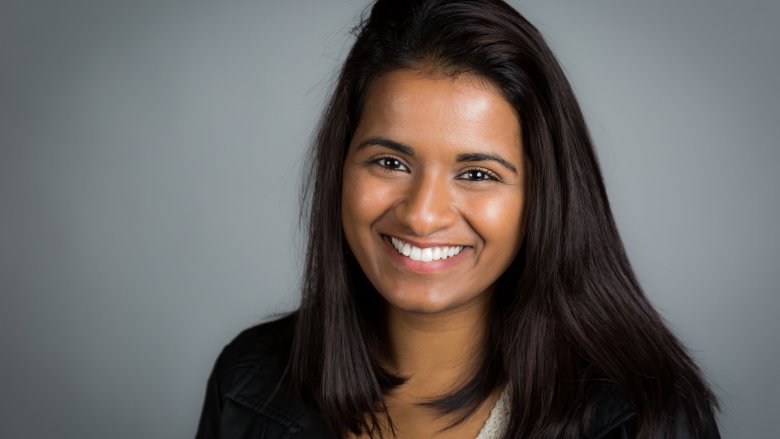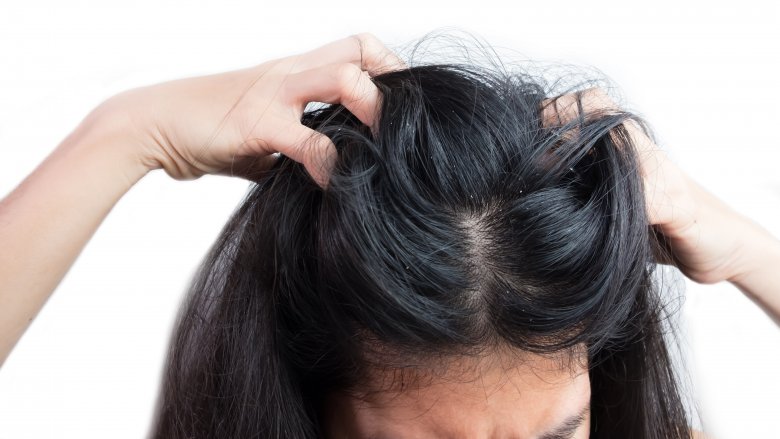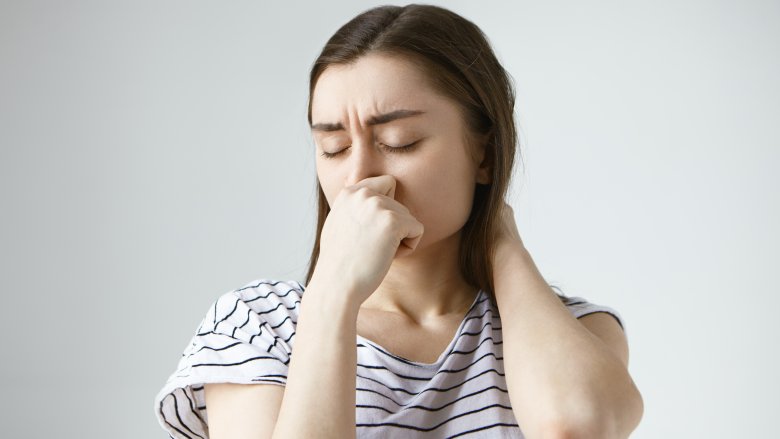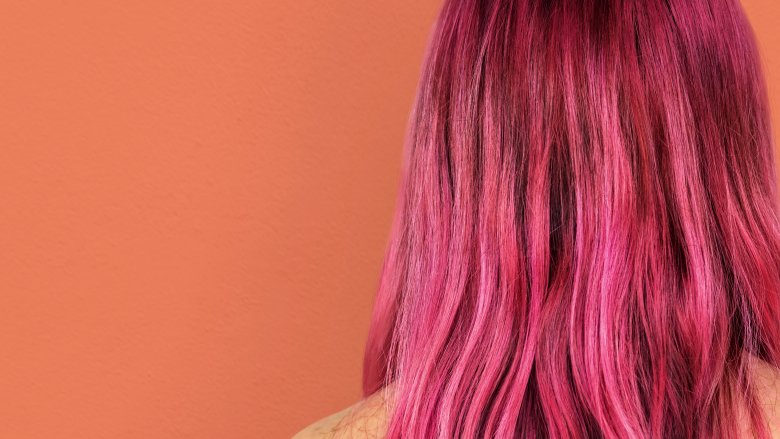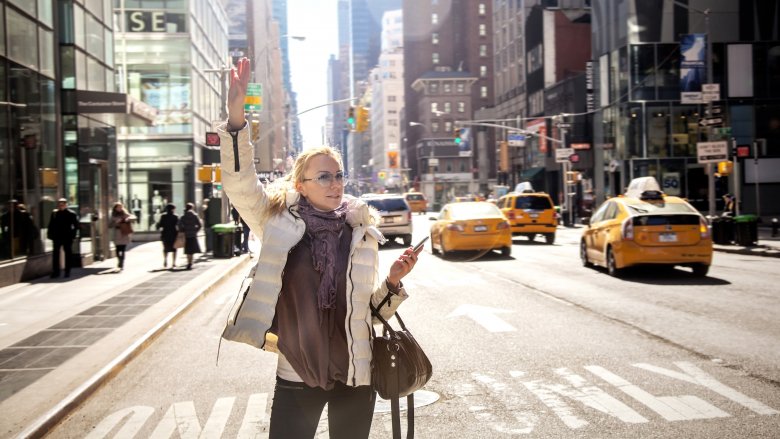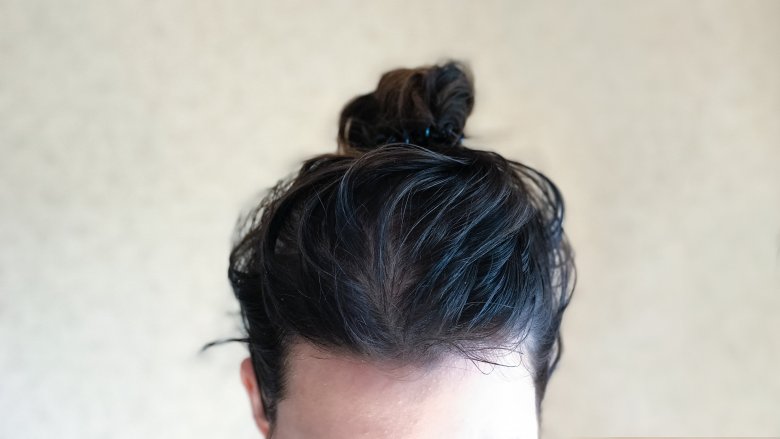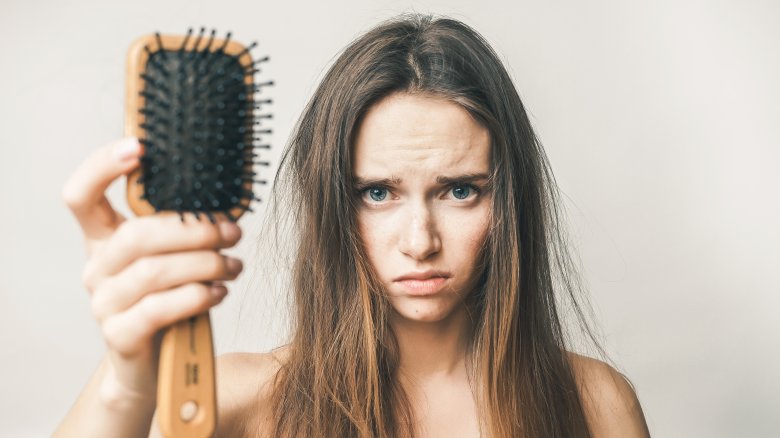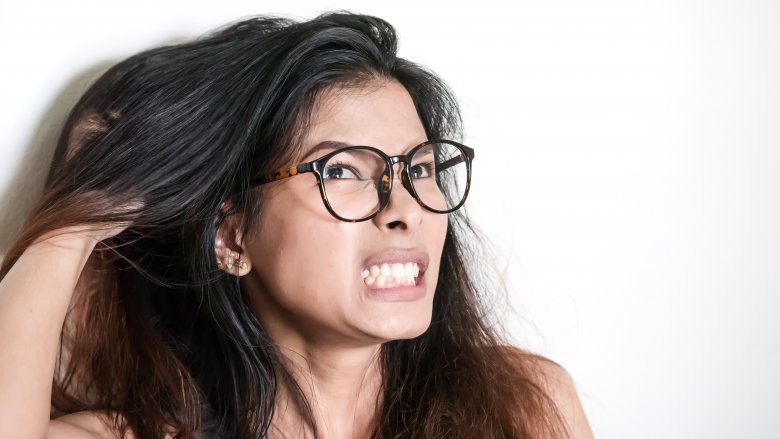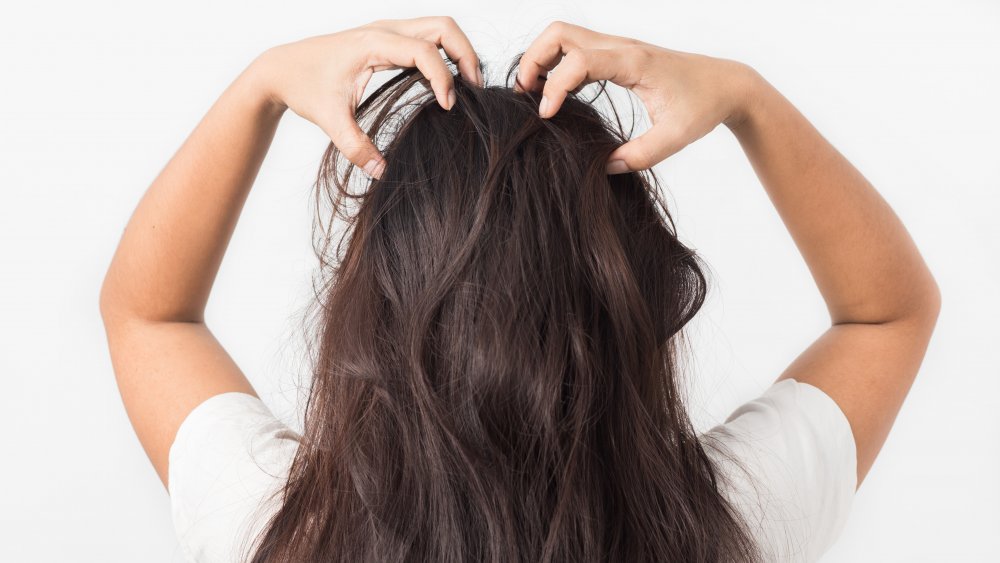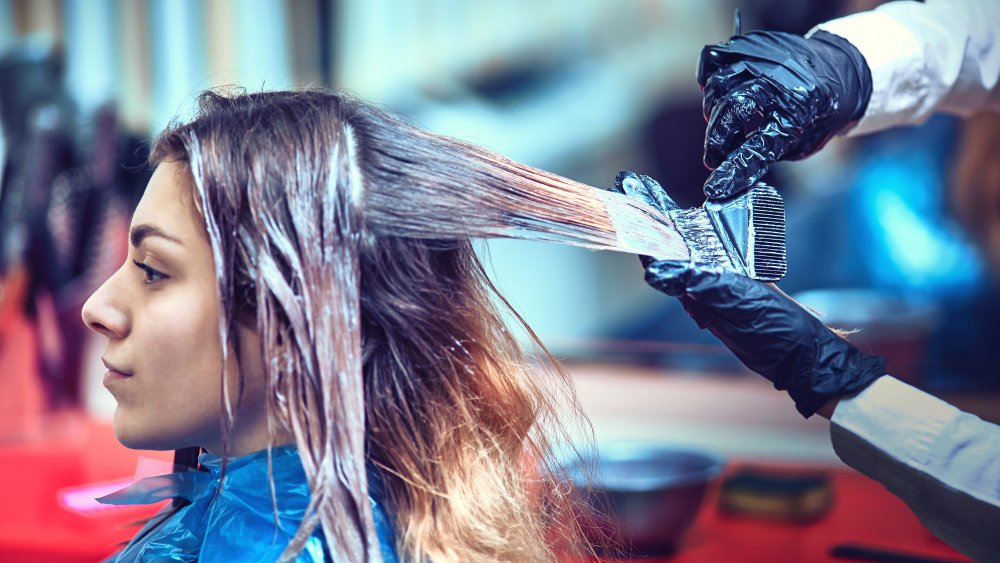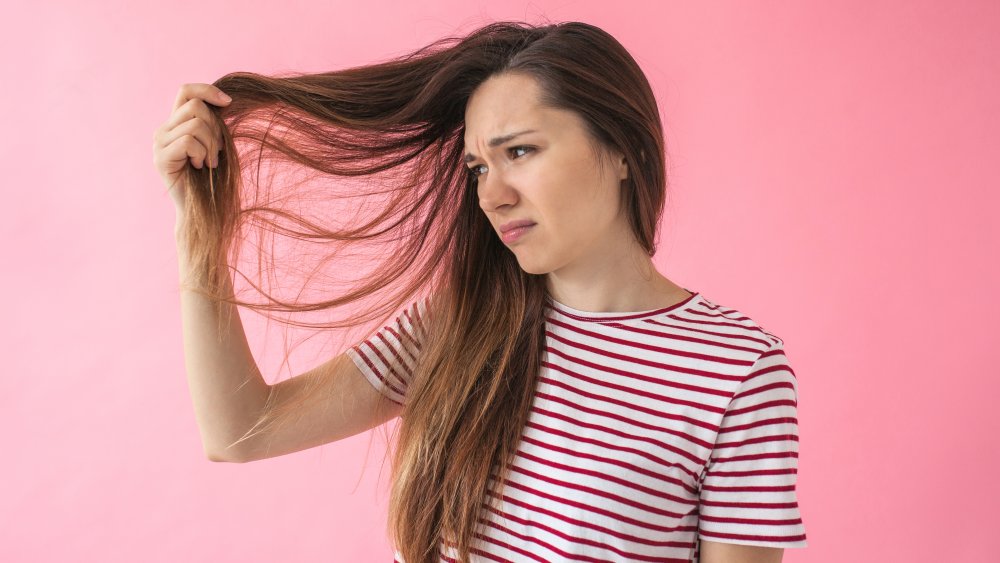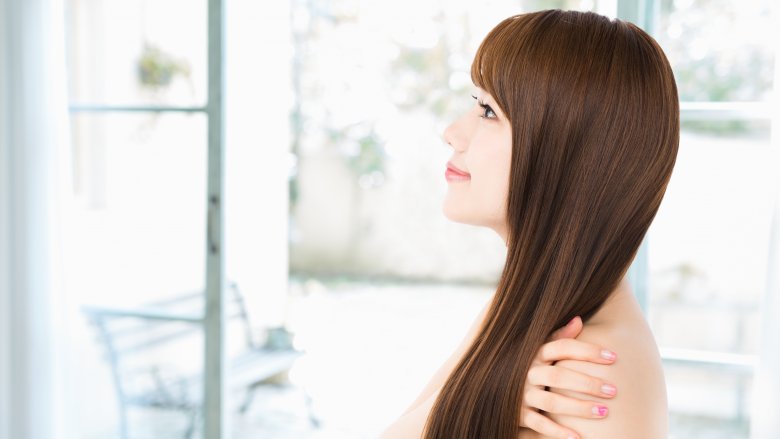This Is What Happens When You Stop Washing Your Hair
Can we be real for a minute? We've all gone longer than we'd care to admit without washing our hair. Washing, drying, and styling our manes is a whole thing and, sometimes, you just can't be bothered to do it. But what if you skipped washing your hair for longer than a few days? What if you went weeks, months, or even years — yes, years — without shampooing your locks?
In the early 1900s, this would've been the case for all women. Nicole Rogers, assistant clinical professor of dermatology at Tulane University in Louisiana, explained to Health that modern shampoo is relatively new. Prior to the '30s, people would use bar soap to clean their hair. Once shampoo arrived on the scene, it wasn't used with the frequency it is today. "Women would go to the salon and get their hair set, using products that were meant to hold their style for several days, because the act of drying and styling took so long," said New York City-based celebrity hair stylist Sarah Potempa.
While many people in the United States now wash their hair on a near-daily basis, there are others who've joined the "No Poo" movement and have given up shampoo entirely. Is that a good idea? Well, here's what could happen when you give up on washing your hair.
Dry hair will be a thing of the past
If you're someone who washes your hair on the reg, you may have noticed some seriously parched strands. One of the benefits of forgoing daily shampoo sessions is the return of nourished hair. While you may think conditioner is the best thing you can use to prevent dry hair, our scalps are actually pretty proficient at doing that all on their own.
"Sebum is produced by each individual [hair] follicle via the sebaceous gland," Guy Parson, a hairstylist and certified trichologist, told Harper's Bazaar. Sebum, or oil, is, of course, responsible for making our hair feel greasy in between washes, but it's also what our scalps produce to naturally hydrate our hair. "This sebum is just as important to get silky strands as any conditioner you can purchase," Elle Kinney, a hairstylist at Livian Salon in New York City, told Prevention. If left to its own devices, your hair's oil will effectively hydrate your strands.
Hello, shiny hair
When shampooing your hair, you may be cleansing it, but you're also stripping your scalp of what it needs to make your hair shiny. "Hair will certainly be more lustrous when given time to renew in its own oils," hairstylist Elle Kinney told Prevention. And, really, who doesn't love shiny hair? Unfortunately, your scalp is not exactly great at evenly distributing oil. This is why the tips of your hair can look dry while your roots will look mighty greasy when you skip a wash.
If you want to maximize shine, Kinney suggested using a flat boar bristle brush to pull the oil from your roots all the way down to the ends of your hair. Lorean Cairns, co-founder of Fox & Jane hair salon in New York City agrees. She explained to Bustle, saying, "Using a boar bristle brush is great, because the natural fibers help distribute the natural oils throughout your hair."
Say bye-bye to a greasy scalp and hello to a shiny head of hair.
You might just experience a breakthrough
If you decide to give the "No Poo" movement a go, you may just experience a total hair breakthrough. Once you're several weeks in, your hair may start readjusting to infrequent washings and, instead of being a greasy mess, will start to look incredibly healthy.
"Certainly there is some truth to that," Angela Lamb, a board-certified dermatologist with Mount Sinai Hospital in New York, confirmed to USA Today. However, a lot of the results you will, or will not, experience comes down to what type of hair you're working with. Lamb explained that women with fine hair or those with naturally less oily locks usually have more success when going shampoo-free. Curlier hair, too, can often survive — and thrive — without frequent shampooing.
If you're not sure if your hair could handle weeks without washing, Lamb suggests trying three to four days to start. If your hair feels greasy, you've got the all clear to proceed. If you develop redness or itchy scales on your scalp, though, it's time to suds up. "That's your body trying to tell you that it needs more frequent washing," she added.
You could get some serious product buildup
Just because you've chosen not to use shampoo doesn't mean you have to give up all of your styling products, right? Well, you may want to consider, at the very least, cutting back. Annie Chiu, a dermatologist in Redondo Beach, California, told Prevention what happens when you add product without later taking it away. Styling creams and other products tend to stay on your scalp if you don't use shampoo to get rid of them. When that happens, the residue can become visible and your hair could even start looking a bit lackluster. This all happens pretty quickly, too. In just a few days of not washing your hair, you may experience some scalp inflammation. "This feels and looks like pimples on the scalp, and can be tender and uncomfortable," Chiu said.
So, what should you do? If your scalp experiences these issues, there may not be much else you can do but give in and use shampoo. Lorean Cairns, as referenced above, told Prevention, "Clarifying shampoos are the best way to get rid of buildup of any kind." In order to avoid drying out your hair, clarifying once a month should be enough.
What's that smell?
This is arguably the grossest part of the shampooless trend, but it would be remiss to exclude it: Your hair may start to smell pretty funky when you stop washing it.
Dr. Angela Lamb told USA Today that while not everyone who skips washing their hair will develop a foul odor, those who do may have to endure smelling like sour milk — seriously. According to Lamb, hair traps moisture, which in turn collects bacteria. In just about a week, you may get a tinge of a mildew scent or, worse, a sour smell emanating from the top of your head.
A lot of the science behind the stench has to do with your lifestyle. "If you run five miles a day, you can't go three months without washing your hair," Lamb put it bluntly. And if you have thick hair? Watch out: you're at risk for some real deal malodorous hair.
Longer lasting color
If your hair smells likes a dirty washcloth, there's probably no convincing you of the benefits of going without shampoo. Conversely, if you're one of the lucky ones with a scent-free, shampoo-free mane, you'll be happy to know that your hair color will last a whole lot longer than those who do wash their hair.
"Hair color is like clothes: The more you wash them, the more worn out and faded they become," Will Francis, a colorist at the Sally Hershberger Downtown salon in New York City, told Prevention, "It's the same for your hair — the less you wash it, the more vibrant it will be."
So, is the cleansing effect of your shampoo to blame for the dulling of your dye? According to Francis, it's really not so much the shampoo as it is the water that causes fading. Protecting your hair from water, even if you don't use shampoo, can be difficult though. Rinsing with cold or lukewarm water as opposed to hot is your best bet for long-lasting color.
Your scalp will become home to dust, dirt, and worse
It may come to no surprise to you that if you stop washing your hair, your hair will get dirty. Really dirty. If you don't shampoo you hair with any kind of regularity, Eric Spengler, resident hair scientist at Living Proof, a company that formulates dry shampoo, even admitted that dry shampoo wouldn't be able to cut it at that point. In an interview with Marie Claire, he also said, "If cleansing frequency is not often enough, the dirt and debris could lead to discomfort." But dirt isn't the only thing you're going to be contending with when you toss out your shampoo. You might just start noticing the signs of pollution — on your own head.
"The skin and hair are the first things exposed to pollution, but skin often has the advantage of being protected by lotions, creams, or other treatments," Susanna Romano, partner and stylist at Salon AKS in New York City told Shape. Your hair, on the other hand, doesn't have that superpower. Dust, soot, smoke, and even "gaseous pollutants" (like car exhaust fumes) can make a home in your hair and onto your scalp, making for an itchy, irritated head. If you live in a major city, this problem will likely be even greater for you.
Ouch, dirt hurts
Do you remember the old adage, "Beauty is pain"? Well, as it turns out, dirty is pain, too. At least when it comes to your hair. When you've gone a little too long without washing your hair, you've probably pulled it up high and tight into a secure ponytail. If you're just starting on your "No Poo" journey and are awaiting an epic hair breakthrough, you likely rely on wearing your hair up. However, that comes at a cost.
"Just a couple days of tight ponytails or buns can create enough traction on the scalp to irritate the superficial nerve endings around the hair follicles,"Jennifer Chwalek, a New York City dermatologist and a researcher of hair biology told Allure. Additionally, oily hair is heavier than freshly shampooed hair, causing even more strain on those nerve endings. You're much better off opting for a loose braid then a tight hairstyle during your oily hair stage.
Your hair may stop growing or worse
When you have a cold, you experience a stuffy nose and all of the annoying symptoms that come with congestion. Much the same, your scalp can get congested, but it's not from anything viral. Jenna Mast, a hairstylist in New York City, told Bustle that the overuse of hair products, combined with not washing them away with shampoo, can lead to buildup or, as she explained, "a congested scalp." When your scalp is dealing with too much of that buildup, hair loss can occur. Although you're not exactly going to go bald — phew — it should serve as a clear message to cleanse your hair or, at the very least, take a break from dry shampoo and other hair products for the time being.
Dr. Angela Lamb concurred, explaining to USA Today that this buildup can also be responsible for causing damage to your hair and even impeding its growth.
You could get some pesky ingrown hairs
If you've ever gotten ingrown hairs from shaving, you know just how painful they can be. That said, if you wash your hair fairly frequently, you may have never had to contend with one on your scalp. That may all come to an end when you kiss your shampoo goodbye.
When you stop washing your hair, you also stop getting rid of your natural oils. Of course, your hair continues to do its thing, which is to keep on producing sebum, or oil. "The longer you go between washes, the more dirt and oils will build up on your scalp, which can ... cause ingrown hairs," celebrity hair stylist Scott Yance informed Bustle. Even if you've given up traditional shampoo in favor of the occasional spritz of dry shampoo, you're not exactly protected from ingrown hairs. According to Yance, it, too, can be held responsible for causing the pesky and often painful problem.
Your scalp may start to tingle when you stop washing your hair
Even if you don't throw your unwashed hair into a ponytail, you may still experience a kind of uncomfortable scalp sensation unrelated to tight updos. Although experts aren't exactly sure why this happens when giving up shampoo, Garren, hairstylist and co-founder of R+Co, explained to Fashionista, "When you go awhile without washing, you are not massaging and cleansing, which is what helps keep the hair follicles free of debris and not clogged." Too much debris like product or oil and "your scalp will absolutely tingle," the hairstylist added.
You could also experience pain. Hadley King, a dermatologist and clinical dermatology instructor at the Weill Medical College of Cornell University, mused, "Perhaps the build-up of yeast and bacteria could cause enough inflammation to lead to some tenderness."
Arguably even creepier than clogged hair follicles and bacteria as a result of choosing to stop washing your hair, though, is what some scientists consider a potential culprit for the scalp pain: fungus. "A greasy scalp is a breeding ground for a specific fungus called Malassezia furfur," scientists explained in an article for The Beauty Brains. "The fungus feeds on the oils and releases free fatty acids which can irritate your scalp."
When you stop washing your hair, you may have trouble getting hair dye to stick
Spacing out your wash days may be recommended for prolonging your hair color, but getting hair dye applied is a horse of a different color. You've probably heard that you shouldn't wash your hair just before getting it dyed as the color won't take as well, but that's not true.
"Let's kill the myth that dirty hair is better," Sean Godard, a hairstylist and Global Redken artist, told Redken.com. "Fresh hair will color better with more even results, better gray coverage and increased longevity." Jeff Stump, owner of Artkiteks salon, agrees. "When coloring with demi-permanent color, hair needs to be clean and toweled-dried, per manufacturer directions," he explained to Bustle. "Oily hair won't allow the color to penetrate through the build-up evenly."
So, if you stopped washing your hair with shampoo but still plan on getting it colored, you — and your stylist — may be in for a frustrating salon experience.
What happens when you stop washing your hair really depends on your genes
You've likely heard two opposite schools of thought on the no-shampoo movement. For every person who swears by it, there's another who thinks it's the worst hair trend they've ever tried. So, which is it? Well, both actually.
Angela Lamb, a board-certified dermatologist at New York's Mount Sinai Hospital, told USA Today that some people can likely "get away without washing their hair as much." But, unfortunately, you don't have a say in whether or not you're one such person. While your hair texture and exercise routine plays a role in whether or not you can rock unwashed hair, Lamb told the publication that it also "depends on your genes."
Yes, while there are certain things you can do to fight back against greasy hair, it's thought that your genetic makeup can influence how much oil the glands on your scalp produce. Lamb went on to explain that certain medications and even your hormones can play a role in oil production. "Some [people] can do four, six, seven, eight, nine weeks without shampooing," she revealed. "But it's detrimental for others."
All in all, your hair could end up looking great
With all of the weird and downright scary side effects that potentially await you when you stop washing your hair, why would anyone be willing to take the risk? Well, because your hair may just end up looking beyond phenomenal.
After embracing dirty hair herself, senior stylist Jill Engelson told Bustle,"It's strange that I used to think my hair had to be clean to look good when today I literally hate my hair clean because it is always overly silky and flat." If you're a frequent hair washer, it could just be that you're not giving yourself — and your hair — enough time to adjust to the change. You may be someone who can go weeks without any negative results or you might get to day four and have already begun scaring your coworkers with your incessant scratching. It's impossible to truly know unless you give dirty hair the ol' college try.
